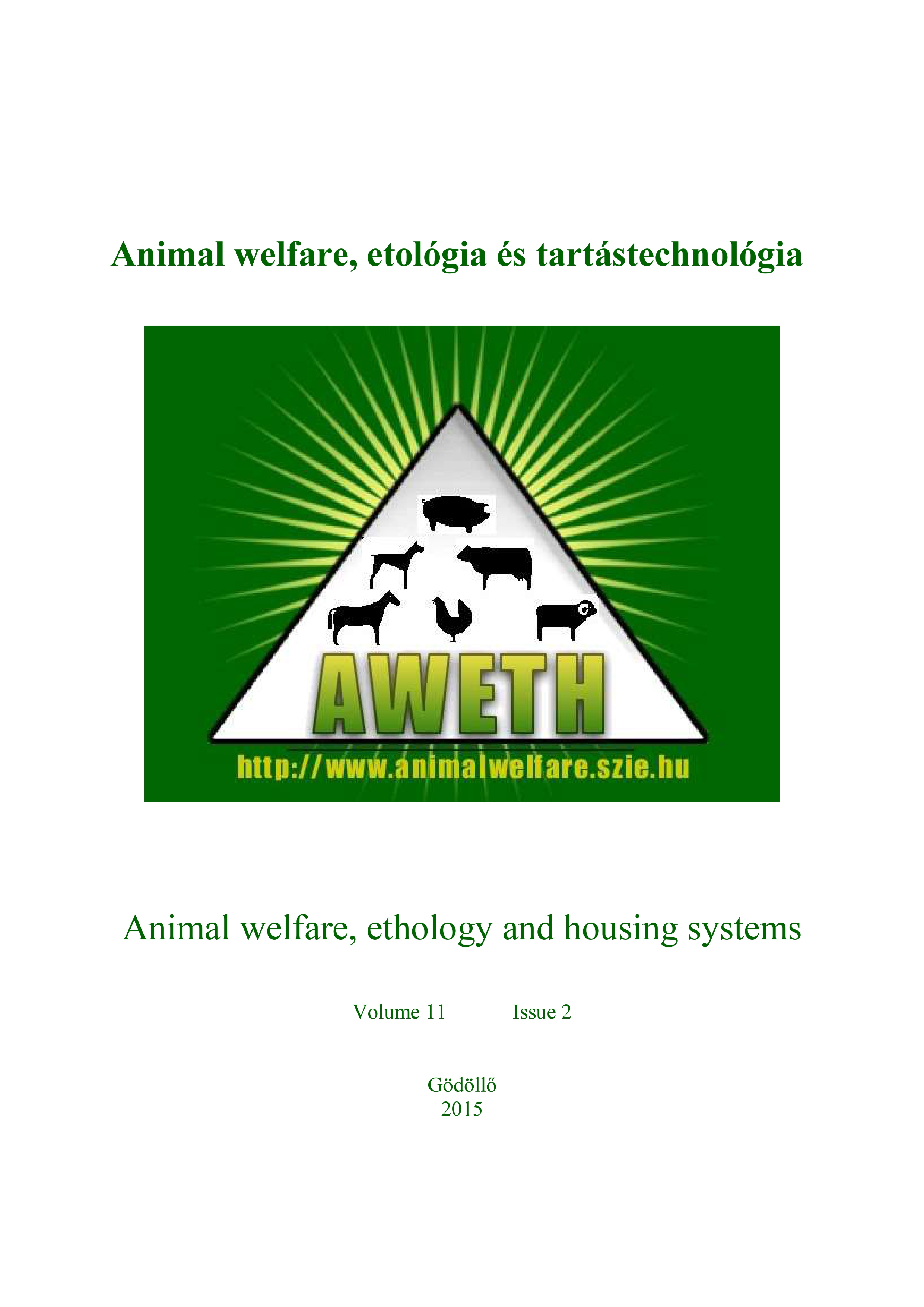Species identification in meat and cheese products by PCR-single strand conformation polymorphism (PCR-SSCP) and DNA sequencing
DOI:
https://doi.org/10.17205/SZIE.AWETH.2015.2.78Keywords:
species identification, PCR-SSCP, DNA sequencingAbstract
In recent years species identification in foodstuffs by molecular biological methods have received more attention than in the earlier decades. The food adulteration scandals have highlighted to the importance of species identification techniques.
In our study foodstuffs were analysed by PCR-SSCP and DNA sequencing techniques. Samples were originated from hypermarkets. DNA was extracted from foodstuffs. After DNA isolation we have amplified 278 bp region of 12S rRNA gene of mitochondrial genome. Amplified fragment was denaturated by high temperature and presence of formamide before SSCP. Denaturated PCR amplicons were separated by non-denaturing polyacrylamide gelelectrophoresis. DNA bands were visualized by silver-staining method. After PCR-SSCP analysis the non-denaturated PCR amplicons of 12 meat and 6 cheese products were analyzed by DNA sequencing.
After PCR-SSCP analysis 6 meat products of 12 samples and 3 cheese products of 6 samples revealed to contain undeclared species. These results were confirmed by DNA sequencing that it showed the same results in the same samples. These results demonstrated that PCR-SSCP method is a reliable technique for species identification analysis in foodstuffs. Furthermore the PCRSSCP method is a low cost method compared to than DNA sequencing or real-time PCR techniques.
References
Chou, C. C., Lin, S. P., Lee, K. M., Hsu, C. T., Vickroy, T. W., Zen, J. M. (2007): Fast differentiation of meats from fifteen animal species by liquid chromatography with electrochemical detection using copper nanoparticle plated electrodes. Journal of Chromatography B, 846(1–2) 230–239. https://doi.org/10.1016/j.jchromb.2006.09.006
Csikos, A., Hodzic, A., Pasic-Juhas, E., Javor, A., Hrković-Porobija, A., Goletic, T., Gulyas, G., Czegledi, L. Applicability and sensitivity of PCR SSCP method for milk species identification in cheese. Acta Alimentaria, 45(1) 69–76. (Accepted manuscript; In press - 2016) https://doi.org/10.1556/066.2016.45.1.9
Dalmasso, A., Fontanella, E., Piatti, P., Civera, T., Rosati, S., Bottero, M. (2004): A multiplex PCR assay for the identification of animal species in feedstuffs. Molecular and Cellular Probes, 18(2) 81–87. https://doi.org/10.1016/j.mcp.2003.09.006
De, S., Brahma, B., Polley, S., Mukherjee, A., Banerjee, D., Gohaina, M., Singh, K.P., Singh, R., Datta, T.K., Goswami, S.L. (2011): Simplex and duplex PCR assays for species specific identification of cattle and buffalo milk and cheese. Food Control, 22(5) 690–696. https://doi.org/10.1016/j.foodcont.2010.09.026
Di Pinto, A., Forte, V. T., Conversano, M. C., Tantillo, G. M. (2005): Duplex polymerase chain reaction for detection of pork meat in horse meat fresh sausages from Italian retail sources. Food Control, 16(5) 391–394. https://doi.org/10.1016/j.foodcont.2004.04.004
Galvani, M., Hamdan, M., Righetti, P. G. (2001): Two-dimensional gel electrophoresis/matrixassisted laser desorption/ionization mass spectrometry of commercial bovine milk. Rapid Communications in Mass Spectrometry, 15(4) 258–264. https://doi.org/10.1002/rcm.220
García-Canas, V., González, R., Cifuentes, A. (2004): The combined use of molecular techniques and capillary electrophoresis in food analysis. Trends in Analytical Chemistry, 23(9) 637–643. https://doi.org/10.1016/j.trac.2004.07.005
Hayashi, K. (1999): Recent enhancements in SSCP. Genetic Analysis: Biomolecular Engineering, 14(5–6) 193–196. https://doi.org/10.1016/S1050-3862(98)00017-5
Hurley, I. P., Coleman, R. C., Ireland, H. E., Williams, J. H. H. (2004): Measurement of bovine IgG by indirect competitive ELISA as a means of detecting milk adulteration. International Journal of Food Science and Technology, 39(8) 873–878. https://doi.org/10.1111/j.1365-2621.2004.00861.x
Kitpipit, T., Sittichan, K., Thanakiatkrai, P. (2014): Direct-multiplex PCR assay for meat species identification in food products. Food Chemistry, 163. 77–82. https://doi.org/10.1016/j.foodchem.2014.04.062
Kocher, T. D., Thomas, W. K., Mayer, A., Edwards, S. V., Pääbo, S., Villablanca, F. X. (1989): Dynamics of mitochondrial DNA evolution in animals: Amplification and sequencing with conserved primers. Proceedings of the National Academy of Sciences USA, 86(16) 6196–6200. https://doi.org/10.1073/pnas.86.16.6196
Lau, C. H., Drinkwater, R. D., Yusoff, K., Tan, S. G., Hetzel, D. J. S., Barker, J. S. F. (1998): Genetic diversity of Asian water buffalo (Bubalus bubalis): Mitochondrial DNA D-loop and cytochrome b sequence variation. Animal Genetics, 29(4) 253–264. https://doi.org/10.1046/j.1365-2052.1998.00309.x
Matsunaga, T., Chikuni, K., Tanabe, R., Muroya, S., Shibata, K., Yamada, J., Shinmura, Y. (1999): A quick and simple method for the identification of meat species and meat products by PCR assay. Meat Science, 51(2) 143–148. https://doi.org/10.1016/S0309-1740(98)00112-0
Mayer, H. K., Heidler, D., Rockenbauer, C. (1997): Determination of the percentages of cows', ewes' and goats' milk in cheese by isoelectric focusing and cation-exchange HPLC of γ- and para-κ-caseins. International Dairy Journal, 7(10) 619–628. https://doi.org/10.1016/S0958-6946(97)00064-2
Merill, C. R., Goldman, D., Van Keuren, M. L. (1984): Gel protein stains: Silver stains. In Methods and Enzimology, 104. 441–447. https://doi.org/10.1016/S0076-6879(84)04111-2
Peters, H., Robinson, P. N. (2010): Temperature and Denaturing Gradient Gel Electrophoresis. In: Patrinos, G. P., Ansorge,W. (ed.)Molecular Diagnostics. Second Edition, Elsevier. pp 75–86. https://doi.org/10.1016/B978-0-12-374537-8.00006-7
Rabilloud, T. (2002): Two-dimensional gel electrophoresis in proteomics: Old, old fashioned, but it still climbs up the mountains. Proteomics, 2(1) 3–10. https://doi.org/10.1002/1615-9861(200201)2:1<3::AID-PROT3>3.0.CO;2-R
Richter, W., Krause, I., Graf, C., Sperrer, I., Schwarzer, C., Klostermeyer, H. (1997): An indirect competetive ELISA for the detection of cows’ milk and caseinate in goats’ and ewes’ milk and cheese using polyclonal antibodies against bovine γ-caseins. Zeitschrift für Lebensmittel-Untersuchung und – Forschung A, 204. 21–26. https://doi.org/10.1007/s002170050030
Downloads
Published
Issue
Section
License
Copyright (c) 2015 Csikós Ádám, Tisza Ákos, Simon Ádám, Gulyás Gabriella, Jávor András, Czeglédi Levente

This work is licensed under a Creative Commons Attribution-NonCommercial-NoDerivatives 4.0 International License.





